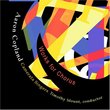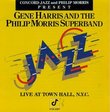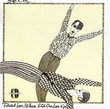| All Artists: Frederic Rzewski, Marc-Andre Hamelin Title: Rzewski: The People United Will Never Be Defeated! Members Wishing: 2 Total Copies: 0 Label: Hyperion UK Release Date: 5/11/1999 Album Type: Import Genre: Classical Styles: Historical Periods, Modern, 20th, & 21st Century, Symphonies Number of Discs: 1 SwapaCD Credits: 1 UPC: 034571170770 |
Search - Frederic Rzewski, Marc-Andre Hamelin :: Rzewski: The People United Will Never Be Defeated!
 | Frederic Rzewski, Marc-Andre Hamelin Rzewski: The People United Will Never Be Defeated! Genre: Classical
Frederic Rzewski's homage to Latin American liberation struggles is well represented, with stunning interpretations by such luminaries as Stephen Drury and Ursula Oppens prior to this version by Marc-André Hamelin. ... more » |
Larger Image |
CD DetailsSynopsis
Amazon.com Frederic Rzewski's homage to Latin American liberation struggles is well represented, with stunning interpretations by such luminaries as Stephen Drury and Ursula Oppens prior to this version by Marc-André Hamelin. Drury's version might well be the high-water mark, in part because New Albion Records wisely included a rousing 1975 live version of the original Sergio Ortega liberation anthem with Quilapayun and thousands of singers to give the piano performance context. But comparing two versions of these 36 variations on the song's theme is fraught, given Rzewski's heavily improvisational performance instructions (e.g., to play variation 11 "like fragments of an absent melody--in strict time," variation 27 "Tenderly, and with a hopeful expression"). Hamelin takes the piece more strictly and in more clearly virtuosic terms than Drury, just as he's taken Scriabin and Medtner. He starts off stronger and paces himself differently, sometimes faster, sometimes slower, but always more deliberately. People is a work prone to radically different interpretations, and while it's easy to compare Hamelin and Drury, it's musically better to take each on its own. It's folksy, rootsy music that gets microtonal in fragments and deconstructs the melody so thoroughly that it'll be 36 times lovelier when you're done listening. The added bonus of Hamelin's version is the inclusion of the warm "Down by the Riverside" and "Winnsboro Cotton Mill Blues," both given the theme-restatement-improvisation processing treatment that marks Rzewski's unparalleled work in traditional folk musics. --Andrew Bartlett Similarly Requested CDs
|
CD ReviewsSuperb performance of a masterpiece Willem A. Labuschagne | New Zealand | 09/07/2004 (5 out of 5 stars) "During the 1970s, the inspiring pianist Ursula Oppens commissioned Rzewski to write a set of variations that she would perform at Carnegie Hall together with Beethoven's Diabelli Variations. The result was a masterpiece of 20th century Romanticism, continuing the clear line from Beethoven through Brahms that faltered with the deaths of McDowell, Medtner, and Rachmaninov in the first half of the 20th century. Rzewski takes a catchy tune, a Chilean protest song, and pulls it apart in a multitude of ways, each subset of variations teasing the listener with increasingly remote references to the original melody. From time to time the effect verges on noise, only to be relieved by a lyrical or passionate return to harmony and tunefulness. As a set of variations, this piece deserves to be classed with the Diabelli Variations and Mendelssohn's equally outstanding Variations Serieuses. While Oppens's performance of Rzewski's "The People United Will Never Be Defeated" was a justifiably famous landmark, doing full justice to the formidable challenge of bringing coherence to a work of such complexity, Marc Andre Hamelin offers something very special in this recording --- a transcendental technique in the original sense of Liszt's term, namely the ability to play difficult passages with such limpid clarity and evenness that the listener's attention is not diverted from the music by an awareness of effort. The combination of Rzewski and Hamelin is irresistible and results in one of the most intense and rewarding listening experiences the piano aficionado can hope for. Hamelin's genius is that his technical virtuosity is never employed for empty display, always to thoughtfully package an insightful interpretation. Intellectually, he is as profound as Brendel, while physically having far greater resources at his disposal. He is a truly remarkable pianist, here playing a truly remarkable work. Having heard Oppens and Hamelin play these variations, each infusing the music with their distinctive personalities, there is only one other pianist whose treatment, were he ever to essay such, I would dearly like to hear --- Lang Lang, the Chinese pianist whose technique like Hamelin's is transcendental and whose innate musicality restrains youthful bravura so that delicacy and control become the features of his performances." Post-modern interpretation of a legendary work Michael W. Taylor | Roswell, Georgia, United States | 06/16/2002 (5 out of 5 stars) "Everything that can be said has be said about Rzewki's 36 Variations on "The People United Shall Never be Defeated!". It is an amazing work that hopefully, and should, stand the test of time and go down as one of the true benchmarks in the classical opus. It is a ravashing series of variations, which are only more amazing when one comes to understand the underlying structure that Rzewski used as his formal blueprint. It is a work of pure genious that must be heard, as words cannot describe it or even begin to do it justice. From the determined mood of the opening theme through the final cadenza and conclusion, the listener is treated to an array of styles an statements (ranging from the blues, to impressions of Stockhausen's 'Klavierstucke X', and many many others) all inevitably leading back to the final declaration, and NEVER losing the spirit of the tune throughout.This work provides American classical piano music with a companion book-end to Ives' Piano Sonata No. 2 "Concord, Mass 1840 - 1860" as truly great, and monumental (!!!), piano works which provide the classical community to the ultimate statements in music.Marc-Andre Hamelin is a pianist who ventures towards the gigantic of the piano repertoire. With that being said, it should come as no suprise that he chose to record this great work (since he has also recorded Alkan, Ives' "Concord" Sonata, and ALL of Godowsky's 53 Studies on Chopin's Etudes). With that being said, it is oh so interesting to hear his reading of "The People United". It is so vastly different from Rzewski's own performance as Hammelin performs it with the classical virtuoso's touch and feel. He is much more straight forward with his pace and use of rubato, but the end result is fantastic. A high degree of determination and invitability can be felt in Mr. Hamelin's performance, which is very fitting of the mood of the original song. Also, there is no mistaking the healthy vitality which resonates through every note. Combining all of these elements creates a performance which is truly special.Do not hesitate one second to purchase this album, as the combination of modern writing laced with classical sensibilities creates a truly unique musical experience that should not be missed." Master Pianist performs 20th Century Piano Masterpiece! mahlerii@aol.com | Richfield, MN | 07/06/1999 (5 out of 5 stars) "This masterpiece is a political statement as well as a well-structured set of variaions on the par with the Goldberg and Diabelli Variations. The theme is very tonal, and Rzewski actually structures the variaions into keys, moving up a fifth each time. These variations are also eclectic. We hear echoes especially to La Folia and Dies Irae, two other themes that have been used for sets of variations. There are also very moderninstic techniques which never lose sight of the theme which never quite leaves you because it is so good. Hamelin is as always a master at this kind of knucklebusting music. Such a description befits the two pieces from the North American Ballads also. Down By the Riverside is given a folsky treatment which gets rather Ivesian later on. The last piece, the Winnsboro Cotton Mill Blues brings out a tone poet as Rzewski uses tone clusters to describe the Cotton Gin machinery. The sound is some of the best I have heard from Hyperion in Hamelin's recordings!"
|

 Track Listings (41) - Disc #1
Track Listings (41) - Disc #1




